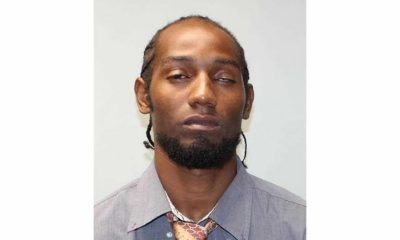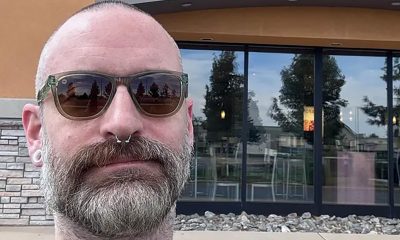Local
Wone trial video shows interrogation of Price, Ward
Gay defendants insist intruder killed Wone

As the conspiracy trial continued this week for three gay men implicated in the 2006 murder of Washington lawyer Robert Wone, it remained unclear whether the men would take the witness stand to testify.
But defendants Joseph Price and Dylan Ward effectively appeared as virtual witnesses Monday and Tuesday as prosecutors showed in the courtroom a police video of homicide detectives questioning the men about the murder.
The interrogations took place in the early morning hours of Aug. 3, 2006, a few hours after Wone was found stabbed to death in a second-floor guest room at Price, Ward and Victor Zaborsky’s upscale townhouse on Swann Street, N.W., near Dupont Circle.
“At no time did Price appear very emotional or upset,” reported Craig Brownstein, a writer with the Who Murdered Robert Wone blog, which described Price’s responses to questions by two detectives sitting beside him in the interrogation room.
Brownstein reported that Ward watched the video intently while sitting behind the defense table, but Price looked straight ahead at the lawyers and never looked at the video.
The men have been charged with obstruction of justice, conspiracy to obstruct justice and evidence tampering. If convicted on all three counts, they face a possible maximum sentence of 38 years in prison. No one has been charged with Wone’s murder.
Transcripts of the videotaped interrogations of Price and Ward show that detectives repeatedly challenged their claim that an unidentified intruder killed Wone after entering their house from a rear door while they were asleep in their respective bedrooms.
Wone’s wife testified last week that her husband, a longtime friend of Price from their days as students at the College of William & Mary, spent the night at the men’s house after working late at his nearby office.
The detectives noted that they found no evidence of a forced entry into the house. They said nothing was taken or disturbed, including valuable items in clear view on the first floor, including a flat screen television. Why would an intruder presumably arriving to burglarize the house bypass expensive items, go upstairs, walk past Ward’s bedroom and enter the room where Wone was sleeping and stab him, the detectives wanted to know.
“I understand it doesn’t make sense,” Ward told them.
Defense attorneys, including gay former D.C. Attorney General Robert Spagnoletti, asked the detectives during their cross examination whether investigators and prosecutors “jumped to conclusions” that the three men were implicated in the murder because of their sexual orientation and their three-way romantic relationship.
The defense has repeatedly referred to Det. Sgt. Daniel Wager’s questioning of Price about why Wone, whose family says he was straight, wanted to stay at their house.
“I got three homosexuals in a house and one straight guy,” he told Price in the interrogation room. “What is he doing there?” Wagner added, “I think you were all drinking wine and you know what’s going to happen tonight.”
Price responded by calling what he considered Wagner’s suggestion that the gay housemates were interested in a sexual encounter with Wone as being “insulting.”
Spagnoletti and defense attorneys David Schertler and Bernard Grimm each pressed the detectives in cross examination about whether they pursued other scenarios in the investigation, including Price’s claim that other people such as contractors had keys to the men’s house. Grimm repeatedly asked Wagner whether his approach to the investigation was shaped by his “attitudes” toward homosexuals.
The detectives replied that, after what they called a thorough assessment of the evidence, they concluded that no intruder entered the house on the night of the murder.
Police and prosecutors say they have evidence showing the three men delayed calling 911 to report the stabbing and appeared to have tampered with the crime scene and covered up evidence to protect the killer. Prosecutors say they believe one or all three of the men know the killer’s identity.
Defense attorneys say they will show that police botched the investigation by failing to pursue and identify the intruder that the defense says murdered Robert Wone.
The trial is expected to continue for at least another three weeks. Judge Lynn Leibovitz, who is presiding over the trial, will decide the defendants’ guilt or innocence following their decision to give up their right to a jury trial.
Maryland
Md. Commission on LGBTQIA+ Affairs released updated student recommendations
LGBTQ students report higher rates of bullying, suicide

The Maryland Commission on LGBTQIA+ Affairs has released updated recommendations on how the state’s schools can support LGBTQ students.
The updated 16-page document outlines eight “actionable recommendations” for Maryland schools, supplemented with data and links to additional resources. The recommendations are:
- Developing and passing a uniform statewide and comprehensive policy aimed at protecting “transgender, nonbinary, and gender expansive students” against discrimination. The recommendation lists minimum requirements for the policy to address: name, pronoun usage, and restroom access.
- Requiring all educators to receive training about the specific needs of LGBTQ students, by trained facilitators. The training’s “core competencies” include instruction on terminology, data, and support for students.
- Implementing LGBTQ-inclusive curricula and preventing book bans. The report highlights a “comprehensive sexual education curriculum” as specifically important in the overall education curriculum. It also states the curriculum will “provide all students with life-saving information about how to protect themselves and others in sexual and romantic situations.”
- Establishing Gender Sexuality Alliances “at all schools and in all grade levels.” This recommendation includes measures on how to adequately establish effective GSAs, such as campaign advertising, and official state resources that outline how to establish and maintain a GSA.
- Providing resources to students’ family members and supporters. This recommendation proposes partnering with local education agencies to provide “culturally responsive, LGBTQIA+ affirming family engagement initiatives.”
- Collecting statewide data on LGBTQ youth. The data on Maryland’s LGBTQ youth population is sparse and non-exhaustive, and this recommendation seeks to collect information to inform policy and programming across the state for LGBTQ youth.
- Hiring a full-time team at the Maryland Department of Education that focuses on LGBTQ student achievement. These employees would have specific duties that include “advising on local and state, and federal policy” as well as developing the LGBTQ curriculum, and organizing the data and family resources.
- Promoting and ensuring awareness of the 2024 guidelines to support LGBTQ students.
The commission has 21 members, with elections every year, and open volunteer positions. It was created in 2021 and amended in 2023 to add more members.
The Governor’s Office of Communication says the commission’s goal is “to serve LGBTQIA+ Marylanders by galvanizing community voices, researching and addressing challenges, and advocating for policies to advance equity and inclusion.”
The commission is tasked with coming up with yearly recommendations. This year’s aim “to ensure that every child can learn in a safe, inclusive, and supportive environment.”
The Human Rights Campaign’s most recent report on LGBTQ youth revealed that 46.1 percent of LGBTQ youth felt unsafe in some school settings. Those numbers are higher for transgender students, with 54.9 percent of them saying they feel unsafe in school.
Maryland’s High School Youth Risk Behavior Survey reveals a disparity in mental health issues and concerns among students who identify as LGBTQ, compared to those who are heterosexual. LGBTQ students report higher rates of bullying, feelings of hopelessness, and suicidal thoughts. Nearly 36 percent of LGBTQ students report they have a suicide plan, and 26.7 percent of respondents say they have attempted to die by suicide.
The commission’s recommendations seek to combat the mental health crisis among the state’s LGBTQ students. They are also a call for local and state governments to work towards implementing them.
Virginia
Va. lawmakers consider partial restoration of Ryan White funds
State Department of Health in 2025 cut $20 million from Part B program

The Virginia General Assembly is considering the partial restoration of HIV funding that the state’s Department of Health cut last year.
The Department of Health in 2025 cut $20 million — or 67 percent of total funding — from the Ryan White Part B program.
The funding cuts started with the Trump-Vance administration passing budget cuts to federal HIV screening and protection programs. Rebate issues between the Virginia Department of Health and the company that provides HIV medications began.
Advocates say the funding cuts have disproportionately impacted lower-income people.
The Ryan White HIV/AIDS Program, a federal program started in 1990, provides medical services, public education, and essential services. Part B offers 21 services, seven of which remained funded after the budget cuts.
Equality Virginia notes “in 2025, a 67 percent reduction severely destabilized HIV services across the commonwealth.”
Virginia lawmakers have approved two bills — House Bill 30 and Senate Bill 30 — that would partially restore the funding. The Ryan White cuts remain a concern among community members.
Both chambers of the General Assembly must review their proposed changes before lawmakers can adopt the bills.
“While these amendments aren’t a full restoration of what community-based organizations lost, this marks a critical step toward stabilizing care for thousands of Virginians living with HIV,” said Equality Virginia Executive Director Narissa Rahaman. “Equality Virginia plans to continue their contact with lawmakers and delegates through the conference and up until the passing of the budget.”
“We appreciate lawmakers from both sides of the aisle who recognized the urgency of this moment and will work to ensure funding remains in the final version signed by the governor,” added Rahaman.
District of Columbia
D.C. Black Pride theme, performers announced at ‘Speakeasy’
Durand Bernarr to headline 2026 programming

The Center for Black Equity held its 2026 DC Black Pride Theme Reveal event at Union Stage on Monday. The evening, a “Speakeasy Happy Hour,” was hosted by Anthony Oakes and featured performances by Lolita Leopard and Keith Angelo. The Center for Black Equity organizes DC Black Pride.
Kenya Hutton, Center for Black Equity president and CEO, spoke following the performances by Leopard and Angelo. Hutton announced this year’s theme for DC Black Pride: “New Black Renaissance.”
Performers for 2026 DC Black Pride were announced to be Bang Garcon, Be Steadwell, Jay Columbus, Bennu Byrd, Rue Pratt and Akeem Woods.
Singer-songwriter Durand Bernarr was announced as the headliner for the 2026 festivities. Bernerr gave brief remarks through a video played on the screen at the stage.
DC Black Pride is scheduled for May 22-25. For more information on DC Black Pride, visit dcblackpride.org.




















